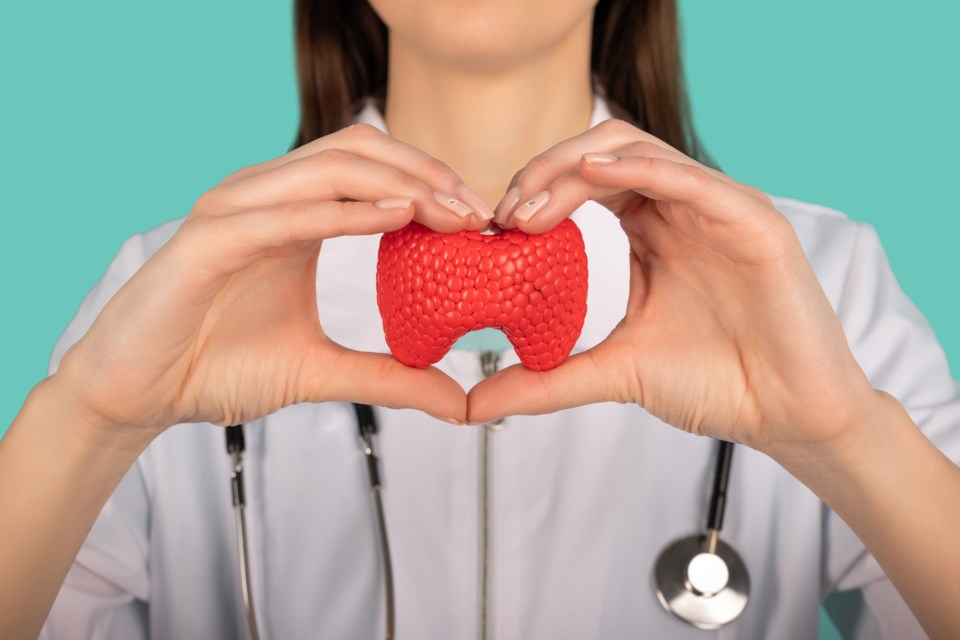If you are a woman, particularly of the middle age variety, you have heard of your thyroid but may not know why it is important, what it does, or when it is out of whack – unless you have had some strange symptoms and your doctor has told you that your thyroid isn’t functioning properly.
What does the thyroid do and why is it important? This little, seemingly insignificant butterfly shaped organ in the upper part of the neck is responsible for a significant amount of our health. It signals the body to produce skeletal & muscle cells, helps to determine gender and helps bring on puberty or menopause. It aids in metabolizing food and affects energy levels which is why weight gain and fatigue are so common for people with a sluggish thyroid. The thyroid helps in the production and balance of the hormones T3, T4, and Calcitonin which also affect other hormones in the body. The thyroid hormones help regulate pulse and blood flow by relaxing blood vessels, contributing to a healthy heart and blood pressure as well as keeping cholesterol levels in check. The thyroid hormones are also responsible for the healthy growth and development of fetus’s and children, as well as regulating the rate that bone tissue is broken down and replaced (which contributes to osteoporosis and brittle bones especially in older women).
There are many symptoms of thyroid dysfunction but the most common issue, especially for middle aged (or older) women, is hypothyroidism (underactive thyroid) where the thyroid gland doesn't produce enough crucial hormones any more. At first, hypothyroidism may not cause any noticeable symptoms but left untreated many health problems could eventually occur.
What are the signs of an underactive thyroid? The most common are weight gain (due to a slowing metabolism) and fatigue but other symptoms may include constipation, dry skin, weakened muscles (aches and stiffness), higher cholesterol, hoarseness, depression, impaired memory, hair loss, face puffiness, sensitivity to temperature and an enlarged goitre.
Sometimes the thyroid is overacting (hyperthyroidism) which occurs when your thyroid gland produces too much of the thyroxine hormone. This can cause accelerated metabolism and unintentional weight loss as well as a rapid or irregular heartbeat.
What else can we do to keep our thyroid healthy? Having a body mass index (BMI) in the healthy range, as well as moderate exercise, helps keep everything working properly. As our BMI increases, our thyroid slows down. Food addiction is an issue for many of us (especially when we eat our feelings) but doesn’t affect us as much when we are young as it does when we are older, after our metabolism has slowed down (often due to thyroid dysfunction or causing thyroid dysfunction).
Thyroid hormones need iodine from our diet to develop properly. Good iodine sources include seaweed (such as kelp, nori, kombu, and wakame), fish (cod & tuna) and other seafood such as shrimp. Eggs and dairy products have some iodine but not as much as seaweed. Iodized salt attempts to deal with the iodine lack in our diets. Iron and zinc are also critical to the proper production of thyroid hormones. Research indicates the antibacterial, antioxidant, and anti-inflammatory properties of turmeric (curcumin) can affect the thyroid gland's environment positively.
Finally, managing stress levels and balancing estrogen levels (in women) contribute to overall thyroid health.
If you relate to the symptoms I have shared and think that your issues may be due to an underactive or overactive thyroid, please ask your doctor to check your thyroid function and hormone levels. Treatment is generally pretty simple.
Claire Nielsen is a health coach, author, public speaker and founder of www.elixirforlife.ca. The information provided in the above article is for educational purposes only and is not a substitute for professional health and medical advice. Please consult a doctor or healthcare provider if you're seeking medical advice, diagnoses and/or treatment.




